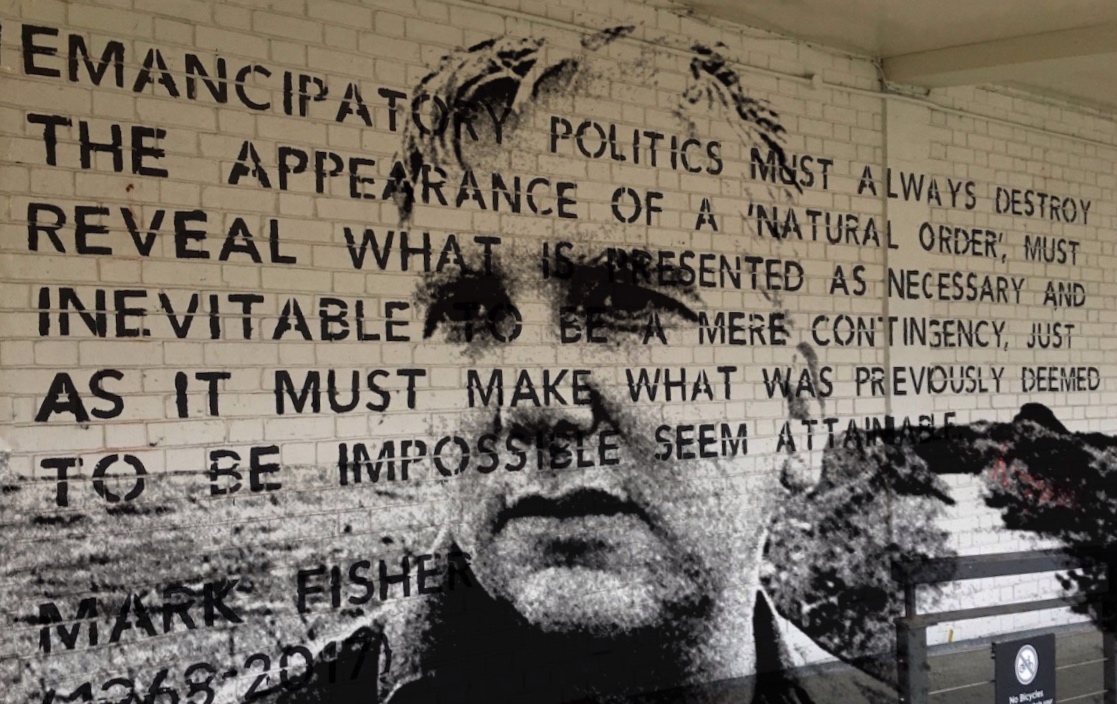(THIS ARTICLE IS MACHINE TRANSLATED by Google from Norwegian)
It is claimed that in our time it is easier to imagine the world than capitalismns doom. The British philosopher Mark Fisher called this "capitalist realism" in a 2009 book of the same name.
Every revolutionary project is quickly eaten up by capitalism. This applies not least to the left Mark Fisher, which is an icon of the radical left side, has been "memed" by the right. This meming, which is probably far more widespread in the USA than in Norway, typically takes the form of online posting of pictures – with new text for the occasion. A famous meme is "Doomer", a simple drawing of a bald young man with an expressionless, melancholy face, or "Are You Winning, Son?", a line drawing of a father entering his son's boy's room.

But is there any point for the left to continue with this? There is every reason to doubt that, based on Mark Fisher's diagnosis of our time as capitalist realism. If there are no alternatives, why even try? Fisher also paradoxically spread radical content online, but nothing escapes capitalist realism. According to Watson, Fisher's book was "memed completely out of context, with tragicomic effect", including with the meme "We Fucking on the X Bed Tonight", where a bed is perfectly made up with a sheet showing the cover of Fisher's book (a The meme also alludes to Jordan Peterson's appeal to the youth to make their beds, which the left felt was a gross oversimplification of their problems).
Just nonsense, of course, but when everything is nonsense, it is difficult to develop a revolutionary practice. The internet is designed to amplify social contradictions, and when people are radicalized in this way, it's just to keep them clicking. Internet leftists can therefore, according to Watson, be compared to selfie makers who download videos and images from TikTok and Instagram to create attention around themselves.
Reveal breaks and cracks
But all hope is still not lost. Watson will investigate whether the Frankfurt School grand old men Theodor W. Adorno, Walter Benjamin and Herbert Marcuse can show the way for one radical practice in the twenty-first century. For Theodor Adorno, theoretical activity was the truly liberating practice under the rule of capitalism. By uncovering fractures and fissures in capitalism's monolithic block, one could open up for liberating practices. Modern avant-garde art in particular was the place to look for such breaks.
Men Ornament at the same time maintained a sharp distinction between theory and political practice. When the student uprising reached the University of Frankfurt, where Adorno was employed, he showed no understanding of the students' actions. The conflict culminated in the famous "puppy assassination" in April 1969, where three female students jumped onto the podium where Adorno was lecturing, surrounded him and flashed their tits. Adorno fought wildly to get out of the situation and left the hall with his hair tousled and in full rage. Marcus, on the other hand, held appeals for the students and believed that the student uprising was a genuinely rebellious act.
When everything is messed with, it is difficult to develop a revolutionary practice.
Watson tries to find a middle way between Adorno's asceticism and Marcuse's actionism, and he finds it in Benjamin and his idea of the flâneur. Benjamin drifted around Paris at a leisurely pace as he took time to look and reflect on what he saw. These flâneries were collected in the book after his death The passenger service (1983, Norwegian translation 2017). By putting things and quotes together without explaining them or rousing people to action, Benjamin thought he could say something significant and critical about capitalist society. In the same way, Watson believes in the book that "the garbage that is today's internet, strewn with spent memes, can reveal something about the nature of capital", and when we slow down online, we can catch a "glimpse of capital's conditions and subsequent possible refigurations”.
The left's drought of ideas
Good intentions notwithstanding, Watson's book gives an involuntary impression of the left's lack of ideas. Yes, it sounds nice to stroll online like another Walter Benjamin, but does it change anything in society? At the time of writing, the center is in Canada's capital Ottawa blocked by truck drivers protesting worsening working conditions due to corona restrictions, and the local authorities have declared a state of emergency. Do the flaneurs of the internet left have something to say to them? Hardly. This should be a problem for Watson, who, according to his own statement, is concerned with promoting the class consciousness of the working class.


